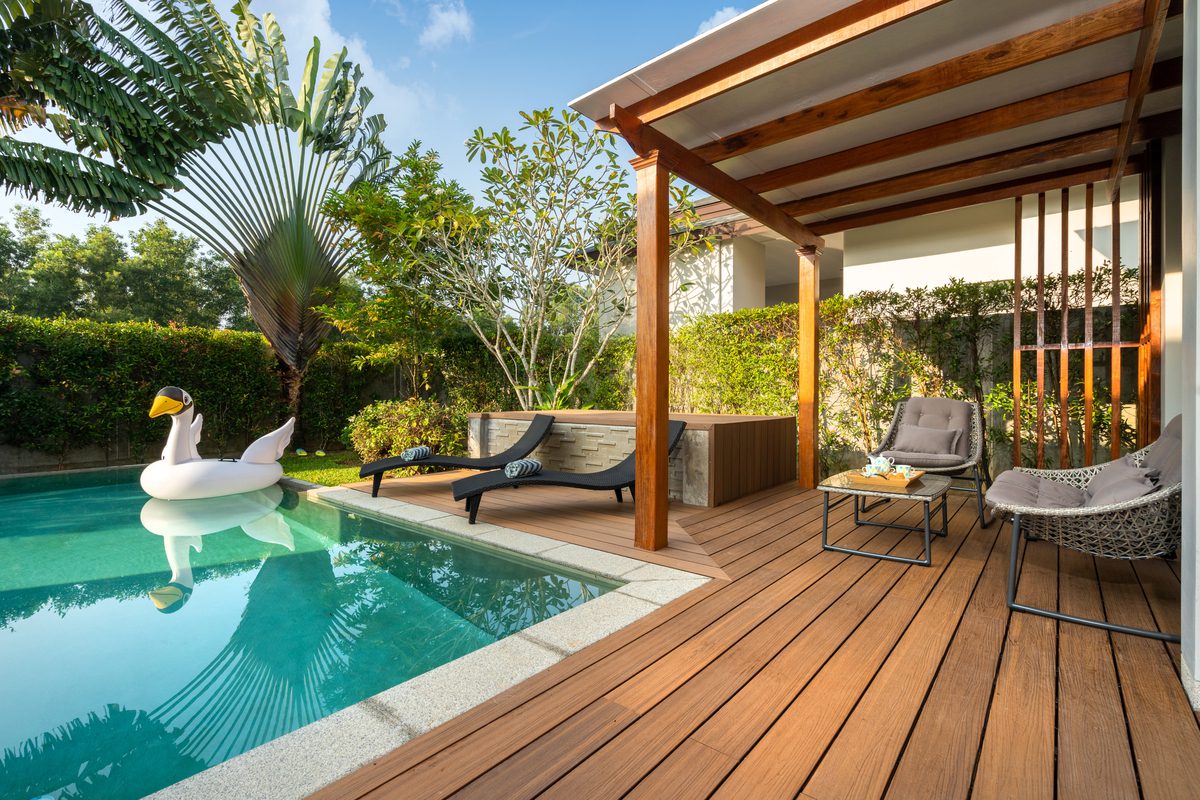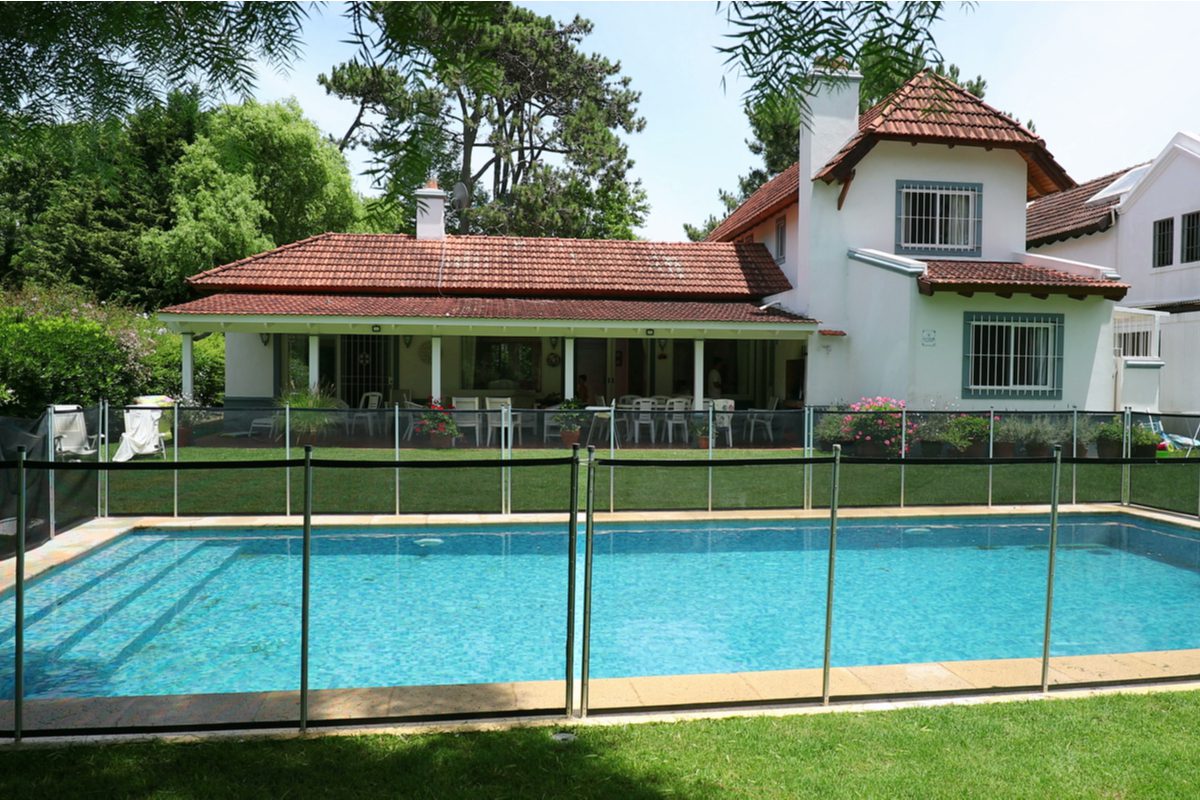9 Things Landlords Should Know Before Renting a Home With a Pool
A swimming pool adds a little something special to your rental property. For one, it's an asset. Adding a pool can increase the value of your home by 5 to 8 percent, according to HGTV. Pools are also an amenity that will attract tenants, which will help you rent your home quickly and generate more income.

But renting a home with a pool comes with a few extra steps for property owners. Here are 10 things to know before renting out your property.
1. Homes with pools bring added risk
Property owners are responsible for keeping their rentals safe and in great shape. Pools add a layer of responsibility and risk. Health hazards, injuries, drownings and other accidents are some things you need to consider.
To prevent these incidents and protect yourself, your tenants and anyone using the pool, proper pool upkeep is necessary. That means testing chlorine levels regularly to avoid an over-chlorinated pool which can cause eye, skin and lung irritation or under-chlorination which creates conditions for algae to grow.
You also need to hang “caution" signs, provide tenants with safety instructions and fix any problems that come up.
2. You could be liable for accidents
Accidents happen. As a property owner, you need to do all you can to make a pool area as safe as possible or you could be held liable. Here are some ways to protect yourself:
- Install safety features to prevent injuries or death
- Follow state and local laws that apply to pool safety. It's a good idea to talk to an attorney to ensure you're well-informed in this realm.
- Have tenants sign a pool waiver
- Perform regular pool maintenance
- Make repairs and address tenants' concerns as quickly as possible
- Provide tenants with pool safety instructions when they move in
- Make sure you have adequate insurance that covers the pool
3. You may need to install a pool barrier
Many states and communities require residential pools to include a fence or barrier to make pools safer and prevent accidental drownings. Fences surrounding a pool should reach at least four feet high, according to the U.S. Consumer Product Safety Commission (CPSC). Pools are safest when the barrier surrounds all sides.
When the home acts as one side of a pool's barrier, CPSC suggests installing alarms on all doors leading to the pool area. The doors should have self-latching or feature locks that children can't reach to keep them from accessing the pool without an adult.

4. Other pool safety features are also needed
Along with a pool barrier, CPSC recommends adding a pool cover as another safety precaution. Pool covers that are automatically retractable or have latches offer greater safety for children and pets. And lock up pool cleaning supplies like chlorine.
Emphasize safety by posting signs around the pool with messages like “no diving" or “children must be supervised at all times." Add life rings, a first aid kit, rescue tubes and other safety equipment in case an emergency arises.
5. The rental agreement should include a pool addendum
When renting a home with a pool, add a swimming pool addendum to your rental agreement to protect yourself and your tenants. The addendum should clearly list all the rules for the pool and educate tenants about the risks. Some provisions to think about include:
- Use of the pool is at the tenant's risk, and property owners aren't responsible for injuries incurred by the tenant, guests or others who live at the property
- Tenants are responsible for everyday pool maintenance and upkeep, while property owners will handle other maintenance — and spell out who handles what
- Add details about who pays for damage to the pool
- Include terms for pets
- Require tenants to inform you immediately if repairs occur for the pool, pool area or safety equipment
- Require the fence and gates stay secured and locked at all times
- Tenants and guests must use the pool in compliance with the manufacturer's instructions
- Include provisions for what happens if tenants violate the lease terms
Consult with an attorney who can help customize the pool addendum to your property and ensure that it meets local laws. Make sure tenants read and sign the lease and the pool addendum — and keep a copy for your records.
6. You may need extra insurance
Rental property owners need landlord insurance that provides coverage for the property and liability protection. These policies typically cover the home itself, other structures on the property, and personal property used for the rental, as well as medical bills and legal expenses if someone gets injured at the rental property and you're found responsible.
When you're renting a home with a pool, you likely need extra liability insurance, maybe at least $1 million. How much coverage you need depends on your location, and the type of pool you have and safety measures you have in place, like fences and pool covers, could influence the rate you'll pay.
An experienced insurance agent can make sure you have the coverage you need.
7. Pools need regular maintenance and upkeep
Pools require consistent maintenance, which is costly and time-consuming. Regular pool upkeep includes:
- Skimming to remove debris from the water
- Vacuuming to keep the pool clean
- Chlorinating the pool and checking chlorine levels regularly
- Checking and cleaning filters
- Inspecting the pool to make sure it's in good shape and safe
Your lease agreement should spell out who's responsible for the maintenance. If you handle it yourself or hire a professional, it gets costly. Opting to have your tenants handle the maintenance will save you money, but it's also risky, as they may neglect the pool's upkeep.

8. You might be able to charge more for rent
Renting a home with a swimming pool gives you a competitive edge. It will help your home stand out among other rentals in your area. And, most tenants will appreciate the extra amenity and be willing to pay more for the luxury. So, you can likely charge higher rents.
Maintaining a pool is an ongoing expense that is costly, so you'll want to make sure whatever amount you charge will cover these expenses.
9. Building and maintaining a pool is costly
Pools may add to the value of your home — but they're also a major expense. Building an inground pool can cost $66,500 or even more for a custom pool, and above-ground pools can run $3,600, according to HomeAdvisor.
Also, you're likely to pay about $350 on maintenance each year, and repairs would add in an additional expense. Additional costs include installing a fence or barrier, pool cover and other safety features.
When you decide to rent out a home with a pool, be sure to factor in these expenses when you're deciding how much rent to charge. You'll want to cover the pool's ongoing expenses and possibly try to recoup the cost of installing a pool.
No pool? No problem!
Property owners with rental homes located in a homeowners association (HOA) community can avoid some of the headaches of having a pool. In these communities, tenants will have access to a pool, but the HOA will assume most of the responsibility and maintenance of the pool. Though, you'll likely have to pay HOA fees that cover some of the pool's expenses. Depending on the HOA structure, homeowners may still be liable for injuries or accidents, however.
Renting a home with a pool
Renting a home with a pool will attract tenants and higher rents. These properties also bring added risk and expenses for property owners, however. Understanding the responsibilities of renting a home with a pool is key to successfully managing your property.
